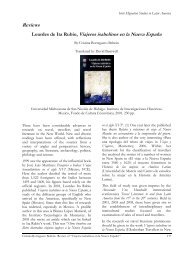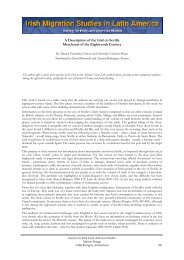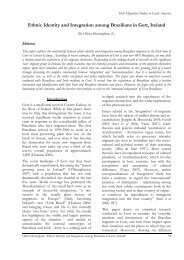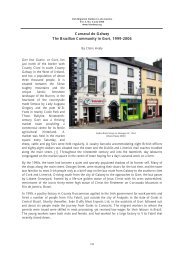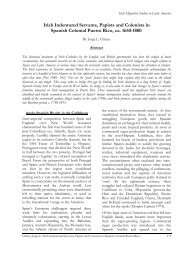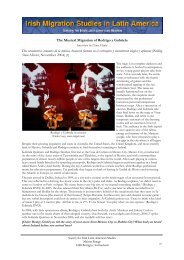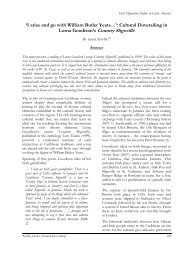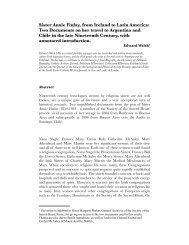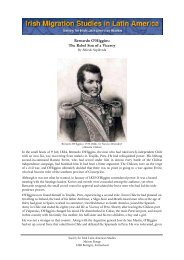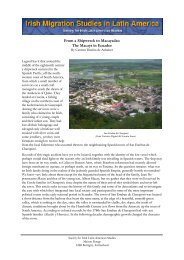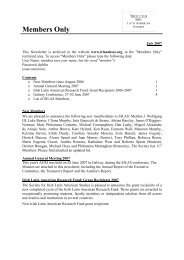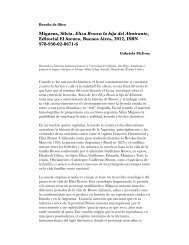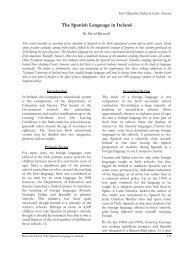I:6 Anti-dumping - Society for Irish Latin American Studies
I:6 Anti-dumping - Society for Irish Latin American Studies
I:6 Anti-dumping - Society for Irish Latin American Studies
Create successful ePaper yourself
Turn your PDF publications into a flip-book with our unique Google optimized e-Paper software.
Other vessels frequently used by the <strong>Irish</strong> were the following [Coghlan 1982, Table I]:<br />
Ship <strong>Irish</strong> passengers 1851-1880 Years of Operation<br />
La Zingara 581 1860-1869<br />
Raymond 312 1861-1863<br />
Bess Grant 170 1849-1861<br />
William Peile 161 1844-1851<br />
Uruguay 155 1863-1869<br />
W. Wilch 116 1857<br />
Vanguard 99 1849<br />
Istria 89 1858-1866<br />
Crossdale 81 1849<br />
Fortitude 57 1829-1849<br />
Hamstead 65 1866-1873<br />
La Belle Poule 61 1859-1864<br />
Williams 61 1838-1865<br />
Be<strong>for</strong>e the 1880s, the most important ship in terms of quantity of <strong>Irish</strong> emigrants was La Zingara, the<br />
smallest vessel of Thomas B. Royden & Co fleet. She was built in 1860, in Liverpool, and was registered<br />
in the Lloyd’s Register of British and Foreign Shipping in 1861. The rigging was a barque, sheathed in<br />
yellow metal in 1860, fastened with copper bolts (287 tons). The captain was George Sanders. John<br />
Murphy remarks that 'passages on La Zingara are cheaper than other vessels like the Raymond from<br />
Dublin (Captain Lenders)' [Murphy to Murphy 1864].<br />
The City of Dresden was the ship that carried ‘the largest number of passengers ever to arrive in Argentina<br />
from any one destination on any one vessel’ [Geraghty 1999]. This event was the outcome of a deceitful<br />
immigration scheme managed by the Argentine government agents in Ireland Buckley O’Meara and John<br />
Stephen Dillon, a brother of Fr. Patrick J. Dillon, founder The Southern Cross, National Deputy <strong>for</strong><br />
Buenos Aires, and notorious leader of the <strong>Irish</strong>-Argentine community. The affair ‘became infamous and<br />
was denounced in Parliament, press and pulpit’ [Geraghty 1999]. These emigrants came from poor urban<br />
areas of Dublin, Cork and Limerick and most of the adults were city labourers and servants. Upon arrival,<br />
some were assisted by <strong>Irish</strong>-Argentine families well established in the country or found jobs in Buenos<br />
Aires, but most of them were deceived by unscrupulous agents and were abandoned in remote areas.<br />
Paradoxically, some of the emigrants (especially children) died in Argentina of hunger and related illnesses,<br />
which were typical of the miserable situation they left in Ireland. The bad press got by this sad events was<br />
enough to stop the <strong>Irish</strong> emigration to Argentina almost completely <strong>for</strong> some decades<br />
The City of Dresden arrived at Buenos Aires from Queenstown (now Cobh) and Southampton on 15<br />
February 1889, with 1,772 passengers on board. According to their only friend, Fr. Gaughran, they<br />
were allowed to land on Saturday when the authorities well knew there was no accommodation <strong>for</strong> them. Many<br />
hundreds of these poor people had not received orders <strong>for</strong> the [Immigrants] hotel be<strong>for</strong>e leaving the ship, and weary<br />
hours were spent in the struggle to get to the table where these orders were issued. Then, the orders obtained, strong<br />
men could fight their way through the throng of Italians [who arrived the same day in the Duchesa di Genova]<br />
into the dining hall, but the weak, the women and children were left supperless. It was soon evident that unless some<br />
special arrangements were made even the shelter of a roof could not be obtained […]. Men, women and children,<br />
Edmundo Murray, The <strong>Irish</strong> Road to South America..................................................................... 39



